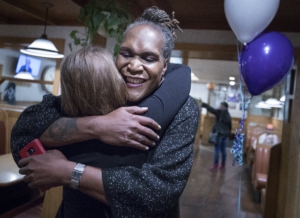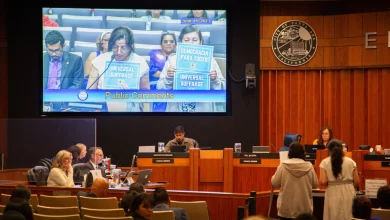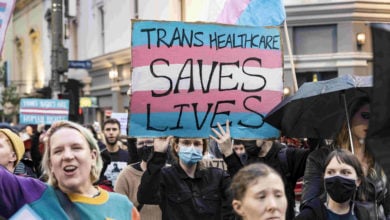
With the elections of trans politicians Danica Roem (Virginia House of Delegates), Andrea Jenkins (Minneapolis, MN City Council), Phillippe Cunningham (Minneapolis, MN City Council), Lisa Middleton (Palm Springs, CA City Council), Stephe Koontz (Doraville, GA City Council), Gerri Cannon (Somersworth, NH School Board), Raven Matherne (Stamford, CT city Board of Representatives) and Tyler Titus (Erie, PA School Board), supporters of trans rights have applauded these victories as milestones.
Notably, with some sense of poetic justice, Roem won her seat from the Virginia delegate who had introduced an anti-trans “bathroom bill” (shot down in a Republican-dominated committee). These electoral victories are important indications of the strength of the trans movement and its support in the population at large. Without taking away from the platforms or qualifications of the individuals elected, people voting for them no doubt saw their vote as repudiating the right wing’s transphobia and as a vote in solidarity with the movement for trans rights.The trans movement gave visibility to the need for trans representation in government, and it is thanks to that movement that these significant victories happened.
Fightback wins gains
The movement for trans rights has grown significantly over the past several years, with many young activists and organizers in particular making a big impact. Despite politicians on both sides of the aisle being largely unenthusiastic about including trans rights in their agendas, pressure from the movement pushed the Obama administration to issue guidelines on nondiscrimination and won many local victories.
Right-wing attacks on trans rights, such as a number of “bathroom bills” and a proposed military ban, galvanized the movement and brought new attention to trans issues.
Increasing awareness of the shocking number of (mostly Black) trans women murdered each year in this country has also provided fuel to the movement.
Under Trump, attacks on trans rights have doubled, but the movement has continued to grow in response, organizing both against harmful legislation and against day-to-day attacks at home and on the street.
With Trans Day of Remembrance coming up, organizers across the country are preparing, not just to mourn, but to strengthen bonds among trans people and help provide resources to communities. 2017 has seen at least 25 murders of trans people, not to mention many suicides and assaults. The Trump administration’s attacks – from school discrimination to an attempted military ban – have caused grassroots organizers and politicians alike to mobilize.
The Democrats are still not the answer
Perhaps one of the most telling things about these multiple victories by trans politicians is they won at a time when the Democratic Party actively discouraged engaging in trans rights advocacy to avoid antagonizing the right. The “common knowledge” within the Democratic Party was that countering bigotry from the right would serve only to divide people; that there wasn’t popular support for a truly progressive stance on social justice issues. The visibility and victories of these campaigns serve as a strong testament to working people’s refusal to accept liberal politics, instead placing trans representation front and center.
However, it is important to note that we cannot rely on these electoral victories alone to win us our rights, safety and dignity. Even looking only at the electoral arena, it would be reductive and disrespectful to trans people to measure these politicians’ merit based on their identity alone.
Beyond the electoral arena, the issue of the corrupt capitalist system still remains, and these victories serve both as a reminder of how powerful our unity is and how important it is to keep fighting for a new system.
If we settle for electing politicians who are more representative of their constituents as an acceptable end game, that may serve to divide social justice movements. A focus on electoral politics as “the” solution diverts the movement’s energy away from grassroots struggle for radical change, which is what will eliminate the institutional basis of bigotry. We must keep fighting for a system that fundamentally respects all people, with rights for LGBTQ and all working-class people constitutionally guaranteed.






